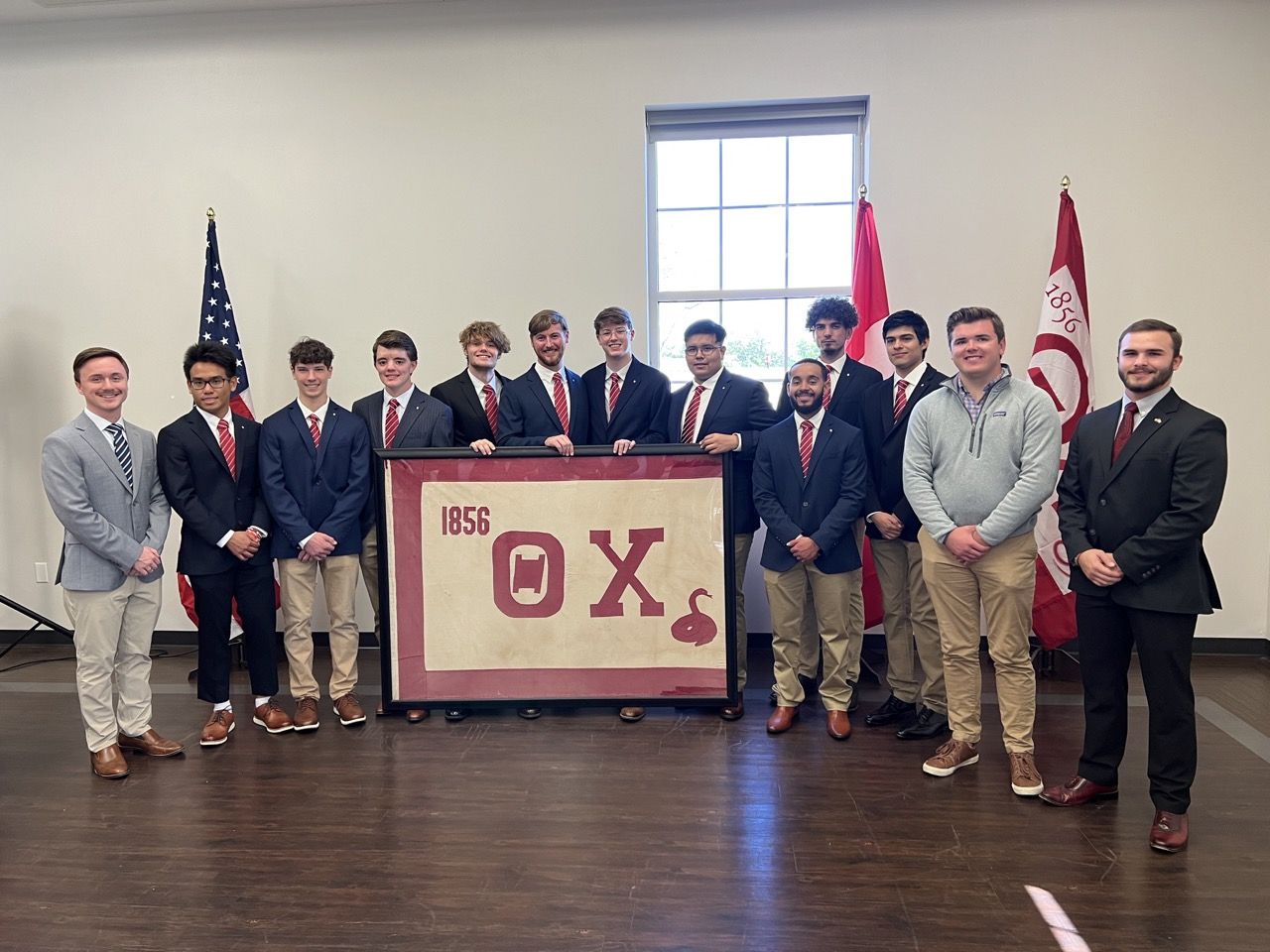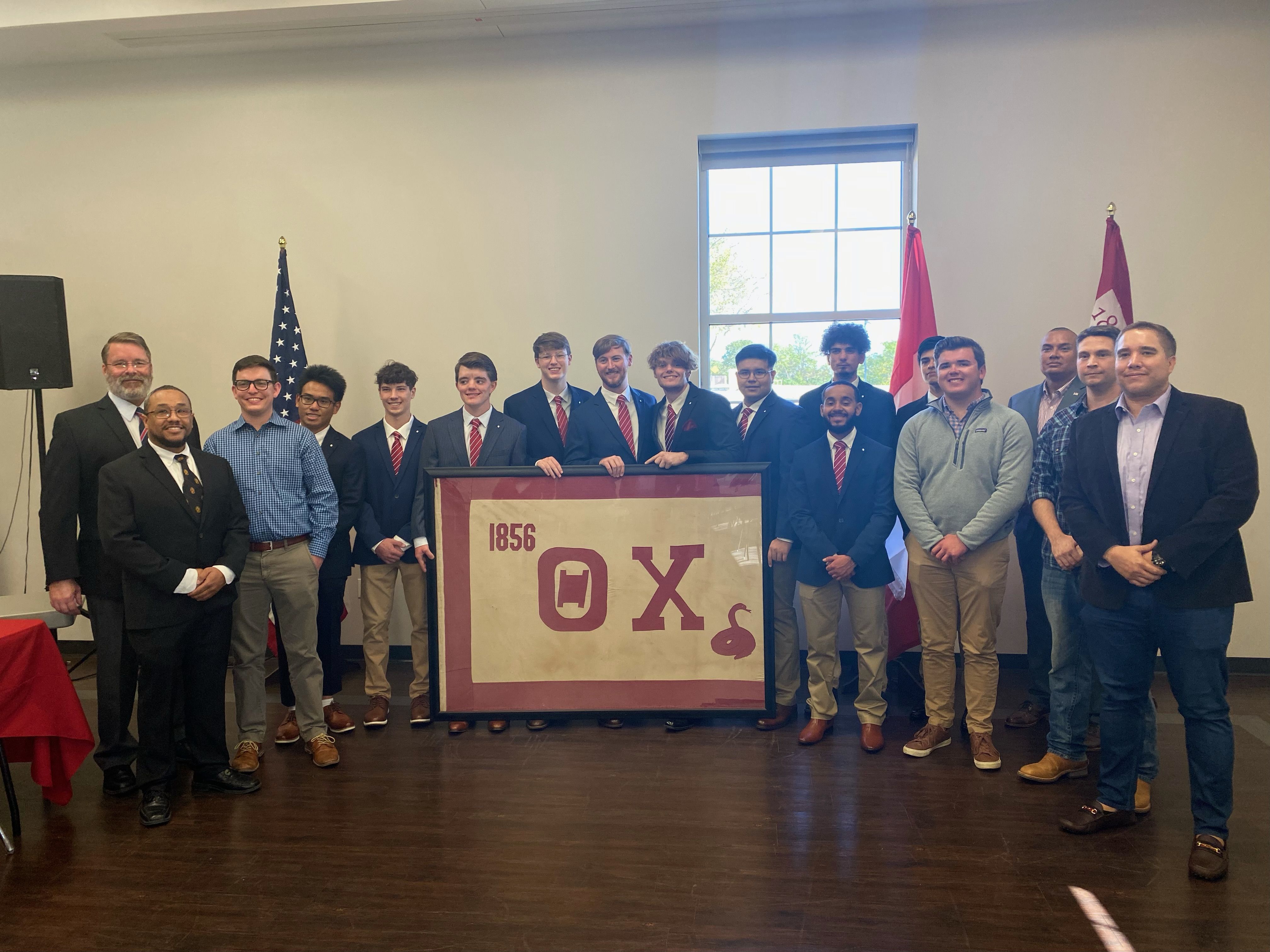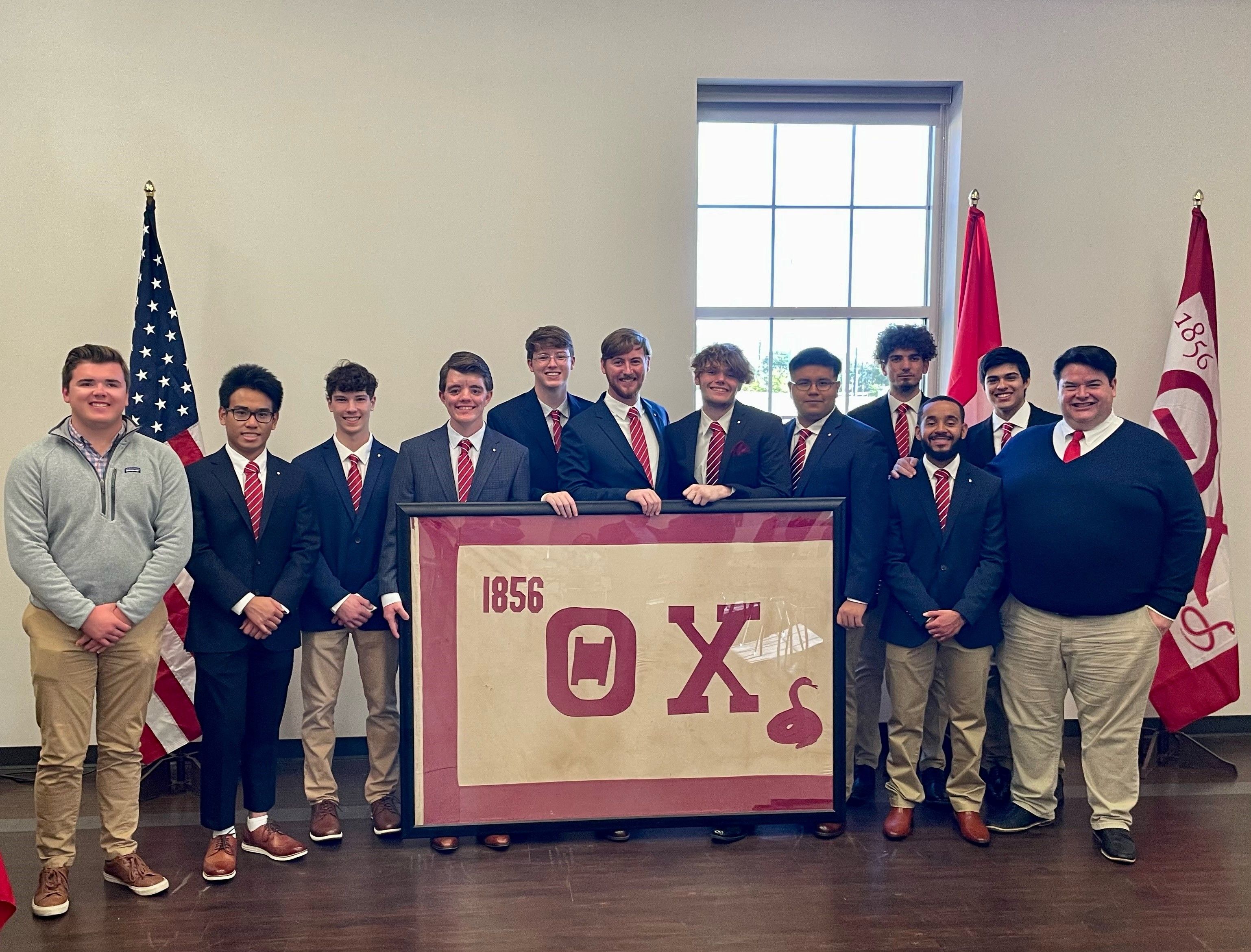Go Mean Green!
Theta Chi Begins Return to North Texas
Theta Chi officially began its return to the University of North Texas at 3 p.m. on November 6, 2022, at the CFSL building in Denton with 10 men who pledged themselves to the ideals and traditions of the Fraternity. Recruited by Growth Specialists Zach Russell and Dylan Inman, the 10 men are:
Kevin Cao (2026)
George Form (2025)
James Garza (2024)
Mercer O’Connell (2026)
Patrick Overton (2026)
Josh Patterson (2025)
Armando Sanchez (2026)
Johnathan Shonkwiler (2026)
Jason Talley (2023)
Cameron Young (2025)
The recolonization ceremony was led by Director of Growth Jermaine Merritt who served as the Presiding Officer for the ceremony. Long-time Delta Mu/Texas Chapter Adviser Joshua Harkins (1999) had the privilege of pinning his nephew, Jason Talley. UNT’s FSL Director Ron Atkinson and IFC Adviser Oscar Celis attended as guests.

The men are involved in a wide range of clubs and activities at UNT, including hall council, student government, the public relations student society, Phi Theta Kappa honors society, the American marketing association, hotel association, intramural basketball, club sailing, guitar club, and much more. Their heavy involvement in other organizations across campus will provide many opportunities to find potential new members. The colony is supported by various Denton/DFW-area alumni who have been slated to advise the group and attended the recolonization, with Armando Vazquez (Delta Phi/North Texas 2008) serving as Colony Adviser. The other four members of the colony advisory board include Tim Neary (Gamma Zeta/Oklahoma State 2019), Jeff Hough (Sigma/Oregon State 1989), Nicolas Romero (Delta Phi/North Texas 2011), and James Guillory (Theta Rho/McNeese State 2003). Gary Holverson (Epsilon Tau/Stephen F. Austin 1991) was also in attendance for the ceremony.

While being formed as an interest group, most of the men did not know each other prior to meeting together. Previously, a few members had pledged in other fraternities on campus, but were not satisfied with their decisions and ultimately withdrew prior to their initiation. Many factors led the men to start their own organization on campus—one they could shape, mold, and lead themselves while engaging men of the quality they seek. The group understands the hard work they have ahead of them in the months and years to come, but it is their shared belief that their hard work will pay off and they’ll be able to write their names in the history books both at UNT and Theta Chi Fraternity.
Some members of the new Delta Phi Colony have friends who are brothers of Theta Chi Fraternity, while others have relatives in other chapters (specifically, Delta Mu/Texas and Iota Kappa/Northern Arizona) who have spoken highly about their experiences in their own chapters of Theta Chi. This, coupled with the positive feelings expressed by various Theta Chi alumni and the International Headquarters staff, the men of the interest group felt even more sure of themselves when decided to apply for colonization with Theta Chi Fraternity. The appeal toward Theta Chi didn’t stop from just hearsay—the Fraternity’s maxim, “Alma Mater First and Theta Chi for Alma Mater,” along with its motto of An Assisting Hand and ideals such as Truth, Temperance, and Tolerance all played a part in these men’s decisions to join Theta Chi. They truly hope to become promoters of knowledge, advancers of culture, and builders of character in both their classrooms and future careers via the teachings of The Resolute Journey, Theta Chi’s pledge education program.
“Serving as the President of the colony, I am excited to be instrumental in the recolonization and future reinstallation of Delta Phi Chapter,” said Joshua Patterson. Patterson understands the amount of pressure placed on him as President of the colony and the expectations that follow. “It is truly humbling to be humbling of this new group, and it is my priority to be a role model and offer the Assisting Hand to all members by perpetuating the ideals of the Fraternity.”
Throughout the process, from the conception of the interest group all the way to Delta Phi’s Recolonization, Director of Growth Jermaine Merritt was there to cultivate this group as they grew. “The colony already understands what it takes to not only be a Resolute Man of Theta Chi, but a man who can make an impact,” Merritt noted. We can expect Delta Phi Colony to breathe a new life into the Greek community at UNT. These men are young, drive, and excited to make a change on their campus. Their knowledge and drive will allow them to seek new avenues to show how they’re different than other men on campus, which will bring in more members than their community has seen from a chapter in recent terms.”
Merritt believes the men of this colony will change UNT’s Greek system for the better. “Our men in Delta Phi Colony have the leadership capabilities to spearhead change on their campus and set the precedent for what a fraternity man should look like,” he notes, “without caring to fit the ‘status quo.’” Senior Director of Growth Zack Brown echoes Merritt’s thoughts when pondering what sets this colony apart from other Greek-letter organizations on UNT’s campus. “This is a group that will not be complacent or settle,” explains Brown. “The brotherhood comes first, and these men will work hard to ensure it remains the priority. Several other fraternities have seen stagnant or even declining membership on UNT’s campus over the years—this group is more interested in continuing to grow while focusing on brotherhood to do so.”

Both Zach Russell and Dylan Inman, Directors of Growth at Theta Chi Fraternity, were integral in reestablishing Theta Chi. For both men, it was their first project as part of the International Headquarters staff. “As my first project, I was nervous and unsure about what to expect at UNT,” recalls Russell. “Once we arrived, we ran into plenty of hurdles, including the inability to table, reserve room spacey, and participate in the IFC’s formal recruitment. We took an alternative approach by creating friendships with people across campus, and I believe this helps us more in the long run.”
Russell goes on to describe how the hardships the group faced to become a colony, speaking further on the barriers they overcame. “While the group was unable to formally recruit and could not be recognized as an official campus organization, these men rallied together to let their presence be known throughout campus by participating in multiple philanthropic efforts, and even won Delta Gamma Sorority’s ‘Anchor Splash Week,” he says.
“The men are a a fun group,” notes Merritt. “They know how to laugh and have a good time, and they act as if they’ve been brothers for years—this will carry them far as a colony if they keep up this energy. Other men on campus will see this and want to find themselves a part of it.”



